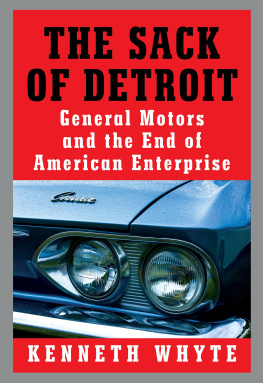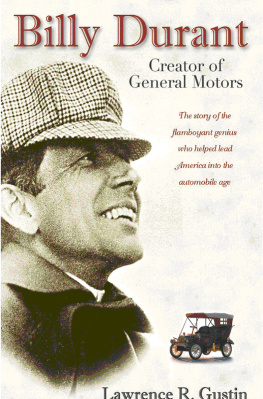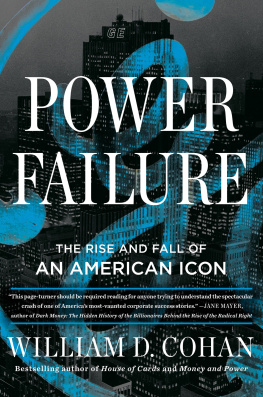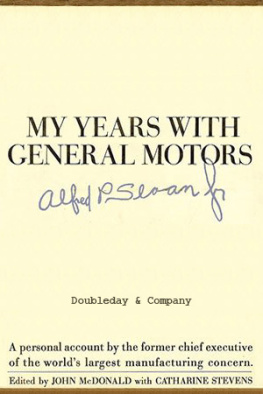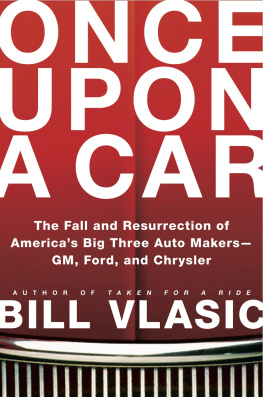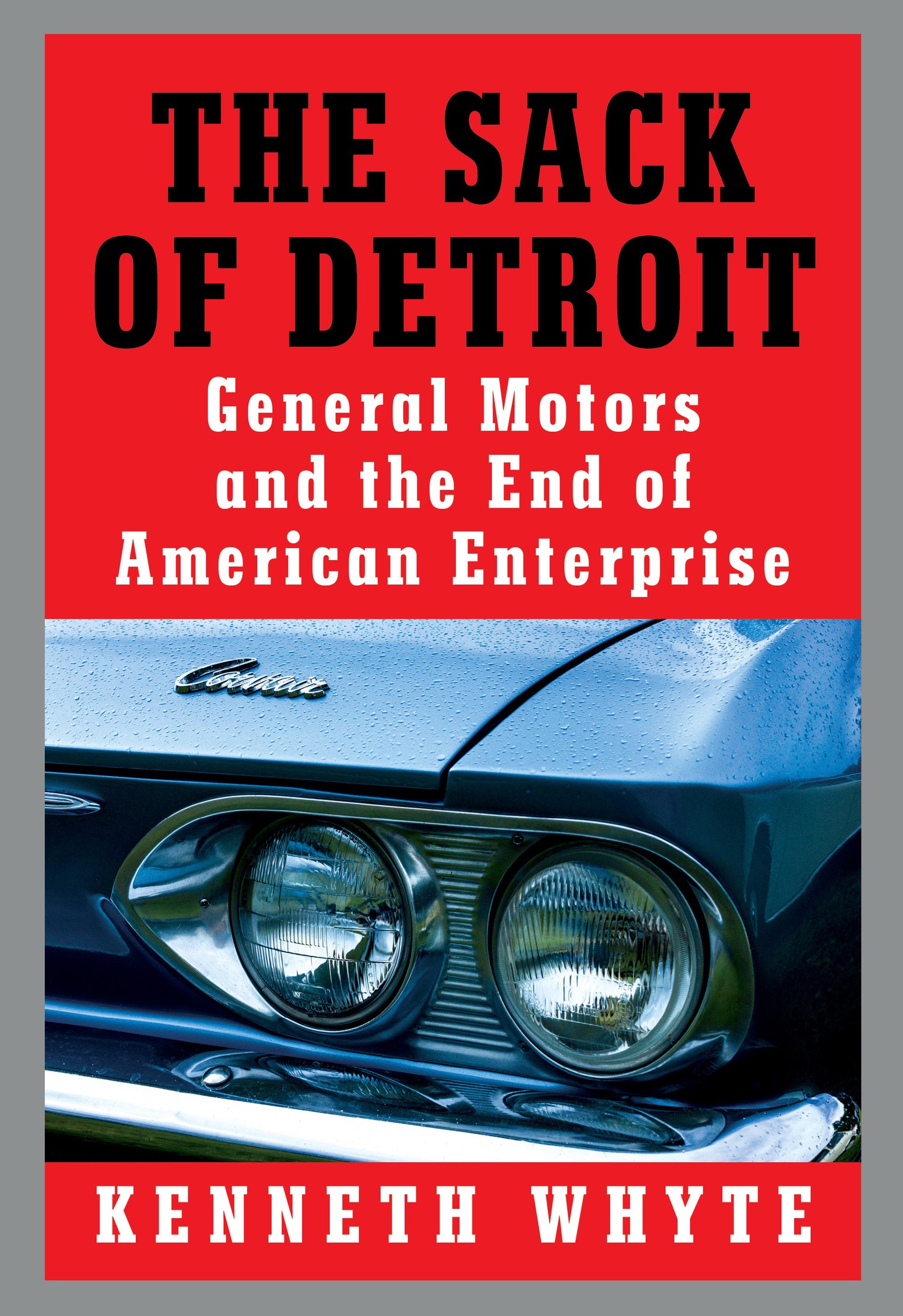Also by Kenneth Whyte
Hoover:
An Extraordinary Life in Extraordinary Times
The Uncrowned King:
The Sensational Rise of William Randolph Hearst
this is a borzoi book
published by alfred a. knopf
Copyright 2021 by Kenneth Whyte
All rights reserved. Published in the United States by Alfred A. Knopf, a division of Penguin Random House LLC, New York, and distributed in Canada by Penguin Random House Canada Limited, Toronto.
www.aaknopf.com
Knopf, Borzoi Books, and the colophon are registered trademarks of Penguin Random House LLC.
Library of Congress Cataloging-in-Publication Data
Names: Whyte, Kenneth, author.
Title: The sack of Detroit: General Motors and the end of American enterprise / Kenneth Whyte.
Description: First edition. | New York: Alfred A. Knopf, [2021] | Includes bibliographical references and index.
Identifiers: lccn 2020042695 (print) | lccn 2020042696 (ebook) | isbn 9780525521679 (hardcover) | isbn 9780525563426 (paperback) | isbn 9780525521686 (ebook)
Subjects: lcsh : General Motors CorporationHistory. | Automobile industry and trade
United StatesHistory. | Detroit (Mich.)History20th century.
Classification: lcc hd . u 52 g 388 2021 (print) | lcc hd 9710. u 52 (ebook) | ddc 338.7/629222097309046dc23
lc record available at https://lccn.loc.gov/2020042695
lc ebook record available at https://lccn.loc.gov/2020042696
Ebook ISBN9780525521686
Cover photograph by Steven Bennett / Alamy
Cover design by Chip Kidd
ep_prh_5.7.0_c0_r0
for Thea Whyte
CONTENTS
Prologue
AMERICAN BERSERKS
This is a book about America in the 1960s, a notoriously hectic time, and it felt that way in the living. The pace of events, the pace of change, seemed to have sped up to a point where, as Norman Cousins famously said, the metabolism of history has gone berserk. It was the era of John F. Kennedy, Lyndon Baines Johnson, and Richard Nixon; of the civil rights movement and landmark decisions from Earl Warrens Supreme Court; of nuclear standoffs and the Vietnam War and student-led antiwar protests; of political violence, assassinations, domestic terrorism, and urban riots; of the womens movement and the birth control pill; of the counterculture, its veneration of youth, and its challenges to authority. It was the era of the moon shot. These were the stories that captured headlines throughout the decade, and they remain the focus of most historical treatments. They deserve the attention they receive but they were not all that happened in the 1960s.
With more than a half centurys perspective, we can now recognize that certain developments considered of moderate to low significance in the moment were, in fact, the stirrings of profound movements that would transform the United States and, indeed, the world. Jill Lepores recent survey of American history, These Truths, does a masterful job of teasing out the development of digital technology in mid-twentieth-century America and how it was almost immediately exploited by opportunistic political operatives determined to segment and divide the citizenry for partisan gain, sowing seeds of the vicious polarization that plagues us today.
Finding in a historical landscape the seeds of later issues or incidents is one way that we improve our perspective on the past. Another is to consider not what grew from that period but what failed to grow, or grew more slowly, or declined. It has become painfully evident over the last half century that America itself ceased to grow at its accustomed pace in the late 1960s. Between 1920 and 1970, despite stretches of world war and depression, Gross Domestic Product (GDP) per American citizen per hour increased at 2.86 percent annually. Since, it has grown far slower, at an average of 1.62 percent a year, a decline of 43 percent, notwithstanding a substantial boost from the personal computer and the digital economy. This collapse in the dynamism of American business, perhaps the greatest mystery in economic history today, was invisible at its start. It was well known that the economy, having grown spectacularly through most of the 1960s, slowed at the end of the decade and fell into a brief recession at the start of the 1970s but there was no sense that anything epochal had occurred. That only became evident with the passage of time.
This book is neither a history of that economic decline nor a quantitative analysis of it. It is an inquiry into the course of American business in the 1960s, a topic largely ignored in the decades record, in part because there was so much else going on but also because American historiography, on the whole, is light on business. It may have been recognized from Benjamin Franklin through Alexis de Tocqueville to Calvin Coolidge that the business of America is business, but historical literature is overwhelmingly concerned with politics, governance, military conflict, and sociology.
More particularly, this book takes as its subject the automobile industry and its leading company, General Motors. As Robert Gordon demonstrates in The Rise and Fall of American Growth, the internal combustion engine shares with electricity the title of most economically important invention of all time. Gas-powered automobiles, trucks, and buses revolutionized transportation in the twentieth century, and the rise of motor vehicle registrations from 2.3 percent of households in 1910 to 140.8 percent in 1970 was a crucial element in producing the world-beating standard of living enjoyed by Americans over this time. At its peak, in the 1960s, the automobile accounted for one in six of the nations jobs, and one in five retail dollars.
Because of the automobiles centrality to American life, General Motors, to an extent almost inconceivable today, was American business in the mid-twentieth century. In the 1950s and 1960s, General Motors produced almost half of the vehicles sold in the United States. It was the largest and most admired corporation in the land and, indeed, in the world. Both Wall Street and Washington recognized G.M. as the engine of American prosperity. In 1953, former company president Charles E. Wilson, nominated as secretary of defense by President Dwight Eisenhower, told his confirmation hearing before the Senate Armed Services Committee: For years I thought what was good for our country was good for General Motors, and vice versa. The difference did not exist. Our company is too big. It goes with the welfare of the country. Our contribution to the nation is quite considerable. While much has been written about the implications of those words, it goes unnoticed that none of the senators challenged them as a statement of fact.
Given General Motors vast scale and the automobiles importance to American prosperity, it should not be controversial to suggest that a study of G.M. in the 1960s will enhance our understanding of American business in this period, and perhaps yield clues as to why the nations commerce has been grinding its gears ever since.
Where the narrative gets more challenging is my contention that the fortunes of General Motors turned on a series of incidents in 1965 and 1966, when the corporation was charged with responsibility for the carnage on American roads, and was subsequently found to be spying on its chief critic, Ralph Nader, whose book

